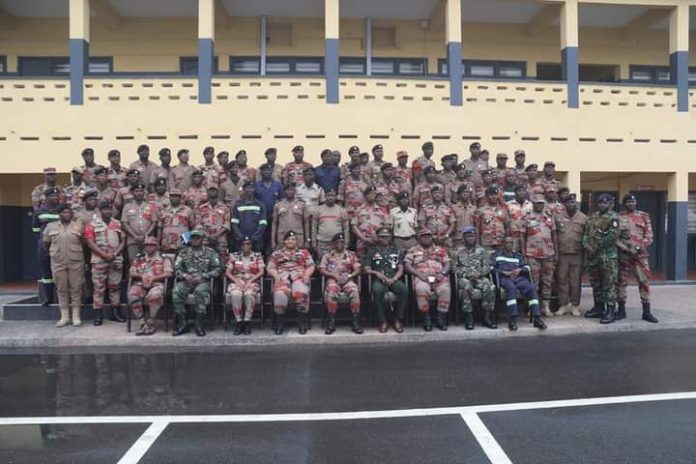The Management of the Ghana National Fire Service has commenced a Refresher Training Course for all drivers employed in the Service at the Fire Academy and Training School (FATS) James Town, Accra in order to prevent the spate of fire engines accidents in the country and as well as sharpen the driving skills of the drivers.
The two (2) weeks intensive training program which is slated for two (2) batches, started on Monday, August 15, 2022 with 344 drivers as the first batch drawn from the nineteen (19) Administration Fire Commands of the Service. The first batch is expected to end their training on Saturday, August 20, 2022 to make way for the second batch which is made up of over 300 drivers to also commence their training on Monday, August 22, 2022 and end on Friday, August 27, 2022 .
The Deputy Commandant of FATS, DO I Ellis Robertson Okoe who represented the Commandant during the opening ceremony for the course, welcomed the participants into the school and described the course as timely and thanked the Chief Fire Officer and his Management team for ensuring this important program.
A speech was read on behalf of the Chief Fire Officer ( CFO), Mr Julius Kuunour by the Director Technical Services, DCFO Frances Rockson in which she revealed the premium the CFO places on in-service training some Metropolitan, Municipal and District Fire Officers in Effective Leadership Course and Fire Safety Inspectors Course for all Regional Fire Safety Officers. She was delighted that it was now the turn of the drivers.
According to CFO Kuunuor, “the role of the driver in the success of any firefighting operation is very critical in saving lives and property. And that when responding to fire and related emergency calls, the lives and safety of the driver and crew members; other road users as well as the victims and their property are equally are important and therefore drivers must take serious precaution to arrive safely at the incident ground”.
He also said that the success of the efforts being made by the Service to reduce its average response time from twelve (12) minutes to four (4) minutes will very much rely on the efficient performance of our drivers even though there may be other external factors beyond our control such as the state of the roads and its associated traffic conditions.
CFO Kuunour also reiterated that the most suitable response to dynamism in all spheres of life is to constantly update and upgrade ones knowledge and skills and the driving profession is no exception. There is no doubt that our drivers have served the service diligently all these years for which he commended them for their hard work and dedication but added that much needs to be done in curbing fire engine crashes.
He further revealed his displeasure about fire engine accidents across the country in which several fire engines have been involved in near-fetal accidents while responding to emergencies. Some of our drivers and firefighters got seriously injured with one death in the unfortunate Obuasi crash which has in many ways created some difficulties for the Service notably some shortfalls in our fleet of serviceable fire engines in the country and as well as its negative implication on our image as a world-class firefighting institution. This has therefore become imperative for our drivers to undertake this training program which will sharpen their already acquired skills and also expose them to new ways of doing things to help us save the lives of our firefighters and also protect fire engines.
In attendance were the Director of Human Resource and Training, DCFO Gifty Mensah Sarpong, the Officer-In-Charge of Transport, DO I Awaafo Adanka and some Senior Instructors of the Training School.
Source: GNFS Communication Department











